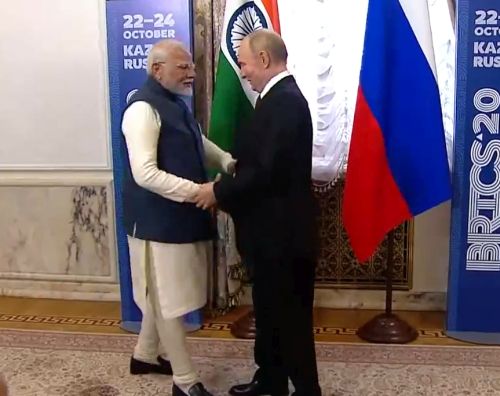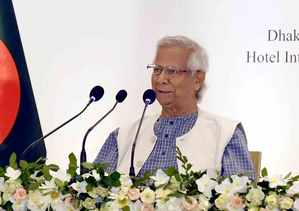International
How Bangladesh broke free while Pakistan remains shackled by military power (IANS Analysis)
New Delhi, Aug 22 (IANS) Sheikh Hasina ruled Bangladesh for over 15 years, securing four consecutive electoral victories. However, it took just 35 days of student-led protests, supported by a significant portion of the population disillusioned by the country’s struggling economy and rising unemployment, to force her out of office.
The ability of the student movement to effect such a political change without plunging Bangladesh into military rule demonstrates that democracy, however fragile, has taken root in the country.
In stark contrast, Pakistan, from which Bangladesh emerged after a bloody war in 1971, faces an even worse economic and unemployment crisis.
Despite year-long student protests and political campaigns advocating for constitutional supremacy, the de facto ruling military dominated hybrid regime of Pakistan has successfully suppressed every cent of dissent from Balochistan to Khyber Pakhtunkhwa to Sindh to Punjab.
This fundamental difference highlights how deeply entrenched the Pakistan Army remains within civilian institutions, reducing its democracy to nothing but a mere illusion.
Yet, the success of the Bangladeshi student’s movement appears to have inspired the Pakistan Students Federation (PSF), a nationwide student organisation, to issue an ultimatum to the government: fulfil their demands by August 30, or face a countrywide agitation.
Among their prominent demands are the restoration of constitutional rule of law, the release of former Prime Minister Imran Khan, who has emerged as a symbol of resistance against the status quo, and the military’s decades-long dominant control over the country’s civilian institutions.
Imran Khan has been imprisoned since August 6, 2023, facing multiple charges including corruption. His wife, Bushra Bibi, who is co-accused in several corruption cases, is also in custody.
While the student calls for democratic revival in Pakistan are encouraging, the situations in Bangladesh and Pakistan are fundamentally different.
In Bangladesh, an elected prime minister, though having concentrated much of power over years, exercised authority over the political system, including the armed forces of the country.
In contrast, in Pakistan, the military retains unassailable power, overseeing a system that functions as an authoritarian hybrid, with only a facade of civilian government.
That should perhaps explain why the protests in Pakistan have largely failed to make any mark with the military establishing using every state resource curb the opposition to its misdeeds.
While the divergent outcome of protest movements in Bangladesh and Pakistan may be intriguing, it requires a deeper examination of their democratic trajectories since 1971, when Bangladesh, then East Pakistan, emerged as an independent state following a bloody military campaign by the Pakistan Army killing thousands of people.
Initially though, both countries exhibited similar tendencies toward military rule.
Bangladesh, for example, has witnessed at least 21 military coup attempts since 1971.
There were three coups in a single year of 1975, beginning with the assassination of its founding President, Sheikh Mujibur Rahman, on August 15, 1975.
During the late 1970s and 1980s, the line between military and civilian bureaucracy was blurred, particularly under Ziaur Rehman’s rule who appointed dozens of retired officers to prominent civilian posts besides offering lucrative jobs across other sectors to hundreds of other officers.
However, since 2008 when Bangladesh Army handed over power to popularly elected Sheikh Hasina-led Awami League government following its two-year rule, the military’s role in political affairs has significantly diminished.
This shift was evident during the recent student-led movement when Army Chief General Waker-uz-Zaman informed PM Sheikh Hasina that his forces would not use violence against civilians, ultimately leading to her resignation on August 5, 2024, thereby bringing end to her 15 years of rule.
Though many expected that the military might usurp power, in reality it has facilitated takeover by a civilian interim government.
Additionally, several senior government officials, including Supreme Court judges perceived close to Hasina’s administration, have since resigned to allow the interim government to take shape, restore the rule of law and oversee new elections as soon as possible.
A decade ago, such developments would have been unexpected, as the military was often poised to seize any opportunity to reclaim political power. This distancing of the military from politics marks a significant democratic gain for Bangladesh.
Unlike Bangladesh, where democracy appears to have taken root, Pakistan has struggled to achieve similar progress. The civilian executive in Pakistan has been largely rendered powerless, with the Pakistan Army dominating the country’s political landscape, either through direct military rule or by manipulating governance from behind the scenes.
The Army has strategically infiltrated Pakistan’s institutions through key appointments, while maintaining the appearance of civilian control.
For instance, Lt. Gen. Sajjad Ghani (retd) heads the Water and Power Development Authority (WAPDA), Lt. Gen. Munir Afsar leads the National Database and Registration Authority (NADRA), and Maj. Gen. Amer Nadeem (retd) oversees the Space and Upper Atmosphere Research Commission (SUPARCO), among many other significant state institutions.
These appointments allow the military establishment the bandwidth to control every aspect of the Pakistani lives.
As such, the Pakistan Army’s political interference and dominance of national institutions have directly impacted the country’s democratic trajectory, hindering the development of strong and stable civilian democratic institutions in Pakistan.
The Pakistan Military, particularly Pak Army’s institutional hold is such that any civilian leader who dares to challenge its status quo faces severe consequences, as is seen with Imran Khan in the current context.
As James Schwemlein (2023) observes, “Pakistan’s political scene has generally been characterized by one rule: where the Pakistan Army’s will exists, it carries, and typically persists no matter the consequences”.
Pakistan’s military has ensured its political relevance by establishing a vast economic empire, weakening civilian institutions, and fostering internal security challenges. Consider, for instance, its extensive economic empire encompassing almost every economic sector from agriculture, manufacturing, education, and construction to real estate.
These commercial ventures are managed by entities like the Fauji Foundation (FF), Army Welfare Trust (AWT), Shaheen Foundation (SF) and Bahria Foundation (BF), interestingly all designated as services welfare organisations. This economic network has vested the Pakistan Army’s officer class with significant financial interests, compelling the military establishment to maintain its dominance over the country’s establishment.
Pakistani analyst Ayesha Siddiqa (2017) highlights, Pakistan Army uses the capital generated from these enterprises “for the personal benefit of the military fraternity, especially the officer cadre, but is neither recorded nor part of the defence budget”.
As such, Pakistan’s so-called democracy, dominated by the military, is nothing but a mere facade.
It is akin to an arcade game of snakes and ladders, where the Pakistan Army sits at the top, ready to strike anyone who dares to challenge its supremacy or questions its political role. The military’s control is reinforced by collaborators within the judiciary, executive, and civilian bureaucracy, enabling it to maintain near-total control of the country.
Therefore, in such a facade of democracy, while it is commendable that the Pakistan Student Federation has issued an ultimatum to the government to fulfil its demands for upholding constitution and releasing political detainees, led by Imran Khan, however, forcing the military to retreat from the political arena will require more than mere rhetoric. Whether Pakistani students can rise to the occasion like their Bangladeshi counterparts or this is just a glib, only the time will reveal.
[Lt Col JS Sodhi (Retd) is Editor, Global Strategic & Defence News, and the Author of ‘China’s War Clouds: The Great Chinese Checkmate’]
–IANS
scor/
International
Lee Hsien Yang seeks refuge in United Kingdom

Lee Hsien Yang, the youngest son of Singapore’s founding father, the late Lee Kuan Yew, announced on Tuesday that he is now a political refugee in the United Kingdom after seeking asylum from the British government “as a last resort.”
“I remain a Singapore citizen and hope that someday it will be safe to return home,” Lee stated in a Facebook post, as reported by Channel News Asia (CNA).
Citing what he described as the Singapore government’s “attacks” against him, Lee, who is the younger brother of former Prime Minister Lee Hsien Loong, revealed that he sought asylum protection in 2022.
Lee Hsien Yang and his late sister, Lee Wei Ling, who passed away earlier this month, have been in conflict with their brother Lee Hsien Loong over the fate of their father’s home following his death in 2015, resulting in a public dispute that has estranged the siblings.
In an interview with the UK-based newspaper The Guardian, Lee alleged that a “campaign of persecution” compelled him to seek asylum in Britain.
In response to his claims, the Singapore government stated that there is “no basis” for his allegations of “a campaign of persecution” or other assertions regarding political repression in the country.
“Singapore’s judiciary is impartial and makes decisions independently. This is why Singaporeans have a high level of trust in the judiciary,” a government spokesperson remarked.
The spokesperson added that there are no legal restrictions preventing Lee and his wife, lawyer Lee Suet Fern, from returning to Singapore. “They are and have always been free to return to Singapore,” the spokesperson said.
Lee and his wife have been outside of Singapore since 2022, having opted not to attend a scheduled police interview regarding potential offenses related to providing false evidence in judicial proceedings concerning their father’s will and the family home.
Lee and his late sister, who had been living at the property, alleged they felt threatened while trying to fulfill their father’s wish to demolish the house. They also accused their elder brother, former Prime Minister Lee Hsien Loong, of abusing his governmental influence to advance his personal agenda.
International
Indo-Russian ties are stronger than ever before at BRICS

Kazan, Russia: Prime Minister Narendra Modi held a bilateral meeting with Russian President Vladimir Putin on the sidelines of the 16th BRICS Summit.
During the meeting, President Putin remarked, “I recall our meeting in July, where we had productive discussions on various issues. We’ve also spoken over the phone several times. I am very grateful you accepted the invitation to come to Kazan. Today, we will attend the BRICS Summit’s opening ceremony, followed by dinner.”
PM Modi responded by expressing his appreciation, saying, “I sincerely thank you for your friendship, warm welcome, and hospitality. It’s a great pleasure to visit such a beautiful city as Kazan for the BRICS Summit. India shares deep historical ties with this city, and the opening of our new embassy here will further strengthen these connections.”
International
Laos seeks to enhance nutrition amid climate change concerns

Vientiane (Laos), Aug 22 (IANS) Representatives from the Lao government and development partners have attended a conference here titled “Climate Change and Nutrition in Laos: Intersections and Interventions” to discuss the impact of climate change on nutrition in the Southeast Asia country and potential solutions.
Speaking at the conference, deputy director general of the Department of Hygiene and Health Promotion under the Lao Ministry of Health Viengkhan Phixay, said, “We gather to address a critical and interwoven issue: the impact of climate change on nutrition and how we can work together to tackle these challenges,” Xinhua news agency reported.
The Lao government is actively engaged in this endeavor, with numerous policies and initiatives aimed at addressing both climate change and nutrition, Lao National Television reported on Thursday.
“By leveraging the Scaling Up Nutrition network in Laos, which is led by the government, and supported by civil society, donors, and the United Nations, we have a robust platform to tackle the negative impacts of climate change while improving nutrition and overall health for everyone in Laos,” Viengkham said at the conference held on Monday.
The conference featured a series of presentations that not only detailed evidence-based research but also introduced innovative tools for measuring and enhancing nutrition under the impact of climate change.
The conference stressed the critical need for integrated approaches to tackle the intertwined challenges of climate change and nutrition, and setting the stage for impactful future collaborations.
–IANS
int/psd
International
One killed, seven injured in shootout in Iraq

Baghdad, Aug 22 (IANS) A civilian was killed while seven others were injured on Thursday in a tribal shootout in Iraq’s holy Shiite province of Najaf, according to a local security source.
The shootout erupted in the early hours between armed men from the local tribe in the al-Zarga area in northern Najaf, some 160 km south of Baghdad, a local police officer told Xinhua on condition of anonymity.
The clash resulted in the killing of an Iraqi civilian and the injury of seven others, including three Iranian Shiite pilgrims, the source added.
A joint force from the Interior Ministry’s emergency response division and Najaf provincial police arrested 53 gunmen from both sides of the shootout and seized weapons and ammunition, the Interior Ministry said in a statement.
It added that search operations are ongoing to locate additional gunmen and weapons, with more details to be released later.
The incident took place as numerous pilgrims traveled to the city of Karbala to observe Arbaeen, which marks the end of a 40-day mourning period for the killing of Imam Hussein, the grandson of Prophet Muhammad, in the Battle of Karbala in 680 A.D.
Typically, these pilgrims also visit Najaf as part of their journey to Karbala.
–IANS
int/jk/arm
International
Bangladesh seeks $1 billion budget support from World Bank

Dhaka, Aug 22 (IANS) Bangladesh’s interim government has sought $1 billion from the World Bank as budgetary support.
The call came from the country’s Power, Energy and Mineral Resources Adviser Muhammad Fouzul Kabir Khan’s meeting with Abdoulaye Seck, the World Bank’s Country Director for Bangladesh and Bhutan, in Dhaka on Wednesday.
He made the plea as the ministry owes more than 2 billion dollars to suppliers in import costs of power and energy, Xinhua news agency reported.
Khan mentioned that the interim government, which was formed with many pressing mandates, is due to settle a $2 billion debt left by the previous government in the power sector.
He said they have already suspended activities under the much-criticized Quick Enhancement of Electricity and Energy Supply Act 2010 and abolished the government’s power to set energy prices without any public hearing.
On August 5, the former Prime Minister of Bangladesh, Sheikh Hasina, was ousted from her country and power, ending her rule since January 2009.
This event was seen as a massive escalation, with what initially started as student’s protests and resulted in a major crisis in Bangladesh.
Earlier on August 8, Nobel laureate Muhammad Yunus took oath as the head of Bangladesh’s interim government.
–IANS
int/jk/as
-
Video2 years ago
PM Modi Attacks Congress in Karnataka with “Kerala Story”
-
Politics2 years ago
Siddaramaiah & DK Shivakumar sworn in as Chief Minister & Deputy CM respectively
-
Cricket2 years ago
CSK players rejoice 5th IPL title with their families (Pics)
-
Entertainment2 years ago
Karan Deol weds his longtime Girlfriend Drisha Acharya (Pics)
-
Sports7 years ago
History Of Official FIFA WORLD CUP Match balls
-
India2 years ago
Ashwini Vaishnaw: Railway Board recommends CBI probe in the Odisha railway disaster
-
Entertainment2 years ago
Urvashi Rautela dazzles on Cannes 2023 red carpet (Pics)
-
Entertainment2 years ago
Sunny Leone gets ready for Kennedy premiere in Cannes (Pics)






























